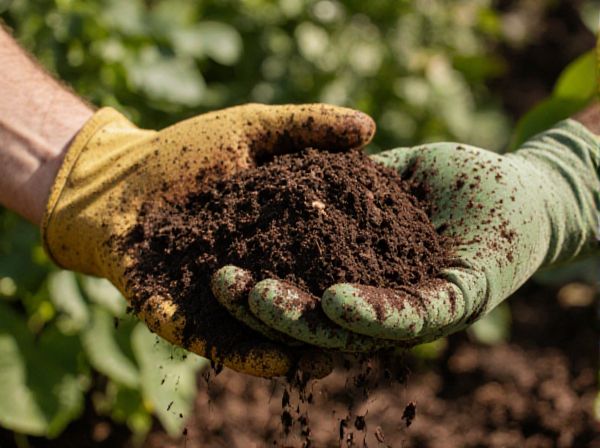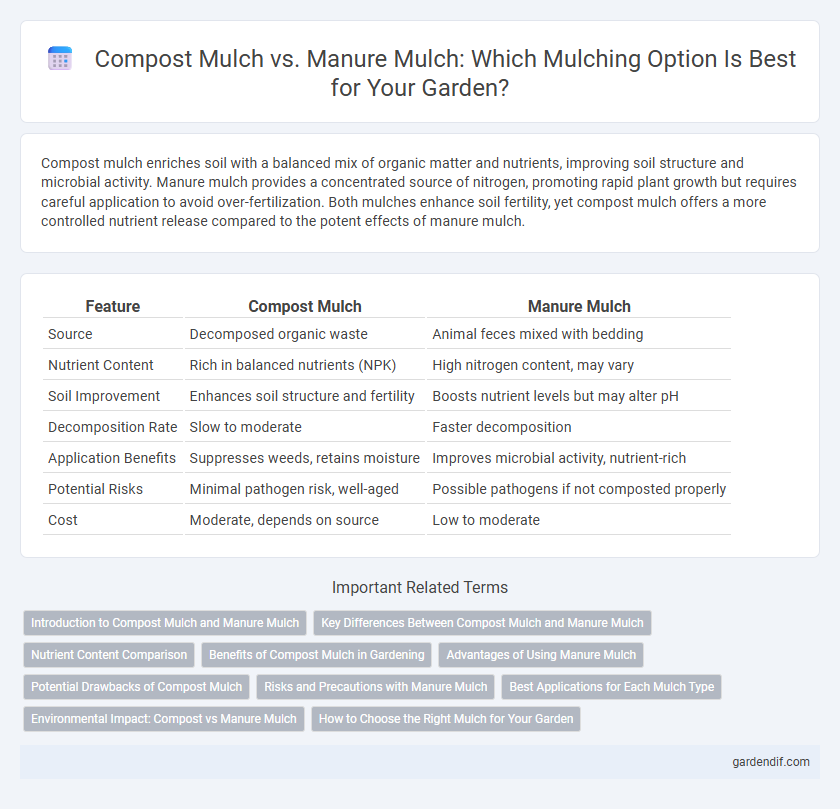
Compost mulch vs Manure mulch Illustration
Compost mulch enriches soil with a balanced mix of organic matter and nutrients, improving soil structure and microbial activity. Manure mulch provides a concentrated source of nitrogen, promoting rapid plant growth but requires careful application to avoid over-fertilization. Both mulches enhance soil fertility, yet compost mulch offers a more controlled nutrient release compared to the potent effects of manure mulch.
Table of Comparison
| Feature | Compost Mulch | Manure Mulch |
|---|---|---|
| Source | Decomposed organic waste | Animal feces mixed with bedding |
| Nutrient Content | Rich in balanced nutrients (NPK) | High nitrogen content, may vary |
| Soil Improvement | Enhances soil structure and fertility | Boosts nutrient levels but may alter pH |
| Decomposition Rate | Slow to moderate | Faster decomposition |
| Application Benefits | Suppresses weeds, retains moisture | Improves microbial activity, nutrient-rich |
| Potential Risks | Minimal pathogen risk, well-aged | Possible pathogens if not composted properly |
| Cost | Moderate, depends on source | Low to moderate |
Introduction to Compost Mulch and Manure Mulch
Compost mulch consists of decomposed organic matter rich in nutrients, improving soil structure and moisture retention while promoting beneficial microbial activity. Manure mulch, derived from animal waste, provides a high level of nitrogen and essential minerals, enhancing soil fertility and stimulating plant growth. Both types of mulch contribute to sustainable gardening by recycling organic waste and enriching the soil ecosystem.
Key Differences Between Compost Mulch and Manure Mulch
Compost mulch is rich in organic matter and nutrients derived from decomposed plant material, offering a balanced slow-release of nutrients that improves soil structure and moisture retention. Manure mulch, sourced from animal waste, provides a higher concentration of nitrogen but may require aging or composting to prevent burning plants and reduce pathogen risks. The choice between compost and manure mulch depends on specific soil needs, nutrient requirements, and timing to ensure optimal plant growth and soil health.
Nutrient Content Comparison
Compost mulch provides a balanced mix of essential nutrients such as nitrogen, phosphorus, and potassium, promoting soil fertility and microbial activity. Manure mulch typically contains higher nitrogen levels but may vary widely in nutrient concentration depending on the animal source and decomposition stage. Combining both mulch types can optimize nutrient availability, enhancing soil structure and plant growth effectively.
Benefits of Compost Mulch in Gardening
Compost mulch enhances soil structure by improving aeration and water retention, promoting healthier root growth and increased nutrient availability for plants. It introduces beneficial microorganisms that help suppress plant diseases and pests, leading to stronger, more resilient garden crops. Unlike manure mulch, compost mulch is less likely to contain pathogens or weed seeds, making it a safer and more balanced option for sustainable gardening.
Advantages of Using Manure Mulch
Manure mulch enriches soil with essential nutrients such as nitrogen, phosphorus, and potassium, promoting healthier plant growth and improved crop yields. It enhances soil structure by increasing organic matter content, which boosts water retention and aeration. Unlike compost mulch, manure mulch provides a more immediate nutrient release, accelerating microbial activity and soil fertility.
Potential Drawbacks of Compost Mulch
Compost mulch can sometimes introduce weed seeds and pathogens, potentially affecting plant health and growth. Its decomposition process may temporarily tie up nitrogen in the soil, leading to nutrient deficiencies for plants. Over-application of compost mulch risks creating overly moist conditions that foster root rot and other fungal diseases.
Risks and Precautions with Manure Mulch
Manure mulch poses risks such as the potential spread of pathogens like E. coli and Salmonella, which can contaminate soil and crops if not properly composted. Precautions include using well-aged or composted manure to reduce harmful bacteria and applying it several months before planting edible crops to allow for pathogen die-off. Monitoring nutrient levels is essential to avoid over-fertilization and nitrogen burn in plants.
Best Applications for Each Mulch Type
Compost mulch is ideal for improving soil structure and nutrient content in vegetable gardens and flower beds, providing a balanced release of nutrients while enhancing microbial activity. Manure mulch, rich in nitrogen, is best suited for heavy-feeding crops like corn and leafy greens, promoting vigorous growth but requiring proper composting to avoid burning plants. Both mulches enhance moisture retention and weed suppression, with compost favored for long-term soil health and manure preferred for quick nutrient boosts.
Environmental Impact: Compost vs Manure Mulch
Compost mulch improves soil health by enhancing microbial activity and increasing nutrient availability while reducing greenhouse gas emissions through organic matter stabilization. Manure mulch, rich in nitrogen, can contribute to nutrient runoff and water pollution if not properly managed but supports carbon sequestration when applied sustainably. Choosing compost mulch over manure mulch often results in lower environmental risks and better long-term soil ecosystem balance.
How to Choose the Right Mulch for Your Garden
Compost mulch enriches soil with balanced nutrients and improves moisture retention, making it ideal for vegetable gardens and flower beds. Manure mulch offers high nitrogen content that boosts plant growth but requires proper aging to avoid burning roots. Selecting the right mulch depends on soil type, plant needs, and desired nutrient release speed to enhance garden health effectively.
Compost mulch vs Manure mulch Infographic

 gardendif.com
gardendif.com